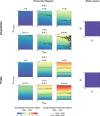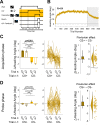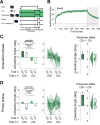Contextual effects in sensorimotor adaptation adhere to associative learning rules
- PMID: 36197002
- PMCID: PMC9635873
- DOI: 10.7554/eLife.75801
Contextual effects in sensorimotor adaptation adhere to associative learning rules
Abstract
Traditional associative learning tasks focus on the formation of associations between salient events and arbitrary stimuli that predict those events. This is exemplified in cerebellar-dependent delay eyeblink conditioning, where arbitrary cues such as a tone or light act as conditioned stimuli (CSs) that predict aversive sensations at the cornea (unconditioned stimulus [US]). Here, we ask if a similar framework could be applied to another type of cerebellar-dependent sensorimotor learning - sensorimotor adaptation. Models of sensorimotor adaptation posit that the introduction of an environmental perturbation results in an error signal that is used to update an internal model of a sensorimotor map for motor planning. Here, we take a step toward an integrative account of these two forms of cerebellar-dependent learning, examining the relevance of core concepts from associative learning for sensorimotor adaptation. Using a visuomotor adaptation reaching task, we paired movement-related feedback (US) with neutral auditory or visual contextual cues that served as CSs. Trial-by-trial changes in feedforward movement kinematics exhibited three key signatures of associative learning: differential conditioning, sensitivity to the CS-US interval, and compound conditioning. Moreover, after compound conditioning, a robust negative correlation was observed between responses to the two elemental CSs of the compound (i.e. overshadowing), consistent with the additivity principle posited by theories of associative learning. The existence of associative learning effects in sensorimotor adaptation provides a proof-of-concept for linking cerebellar-dependent learning paradigms within a common theoretical framework.
Keywords: associative learning; cerebellum; context; forward model; human; neuroscience; sensorimotor adaptation.
© 2022, Avraham et al.
Conflict of interest statement
GA, JT, AB, SM No competing interests declared, RI Senior editor, eLife
Figures












